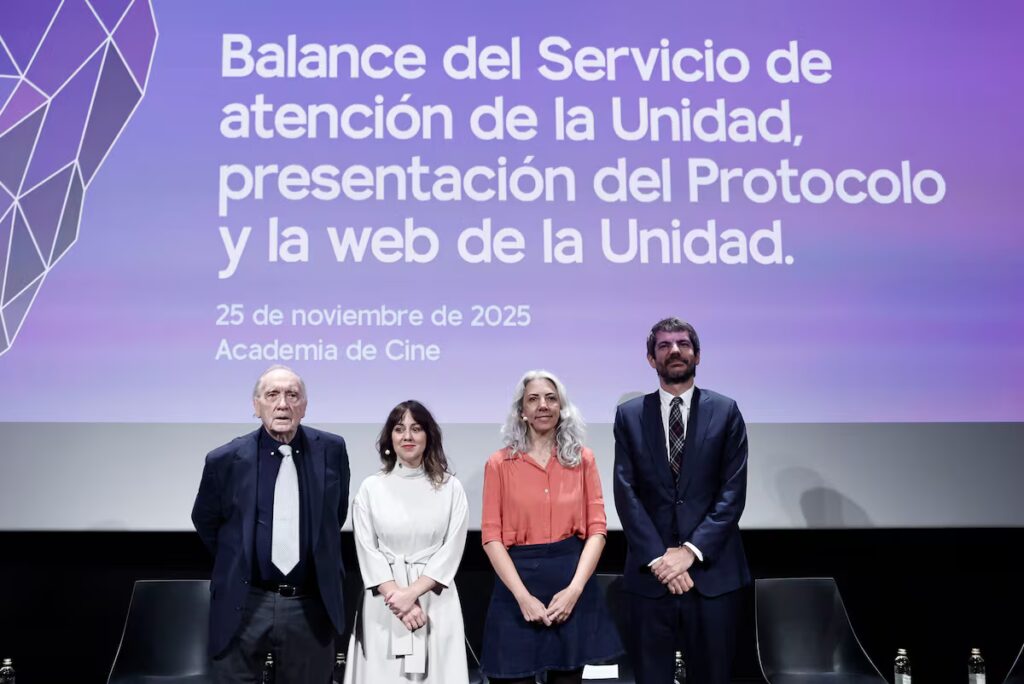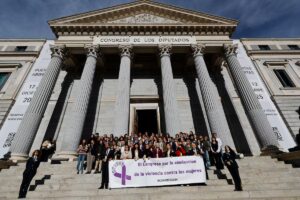
The Unit against sexist violence in the audiovisual and cultural sector, launched on 10 October 2024, responded to 55 questions in its first year of work. Among the questions answered by this service, promoted by the Ministry of Culture and the Film Academy, 43% of the questions received concerned situations of sexual violence, as revealed on Tuesday 25 November, the day on which the International Day for the Elimination of Violence against Women is celebrated. “There is a lot of work to do, but we will not stop until we have eradicated this violence from the cultural sector,” said the Minister of Culture, Ernest Urtasun, presenting the Unit’s report and the Protocol which will serve to prevent sexist violence with minimum action measures for all companies in the cultural sector.
The presentation was made by Jazmín Beirak, director general of Cultural Rights at the Ministry of Culture, and Inés Enciso, coordinator of the Development and Research department of the Film Academy. Beirak explained that the Prevention and Attention Unit against Violence in the Audiovisual and Cultural Sector, created on October 10, 2024, is made up of three parts: the Protocol, presented yesterday by EL PAÍS, the training activities and the annual budget. The Ministry underlines that all these measures “are part of the first Plan on Equality in Culture of the Ministry of Culture, presented in December 2024 and which covers the two-year period 2024-2026”.
The data from the first year of work of the Unit, which offers initial psychological and legal attention, comes from calls received to the Aspacia Foundation, a “feminist non-governmental organization”, charged with dealing with cases in a “confidential and free” way and without the need for a prior judicial complaint. Neither the Ministry nor the Academy has detailed information on the consultations and complaints to protect anonymity.
The Unit handled 55 cases from its launch on October 10, 2024 to October 30 this year. “60% involved information on the services offered; 24% involved legal and psychological issues; 24% of consultations were legal and 5.4% involved psychological issues,” the report states.
Direct victims
Beirak said 67% of the calls were from “direct victims” and 32% were inquiries from people close to those affected. Regarding the type of consultations, the general director underlined: “43% referred to situations of sexual violence, most of which have passed over time and with psychological consequences in the present; 36% to situations of harassment and abuse in the workplace”. In these calls, Aspacia professionals identified, according to the report, “several forms of violence simultaneously; and more than 52% of them had experienced psychological violence.”
Among the data offered by the report it is noted that “18% of cases referred, for example, to abuse of power”. Furthermore, the Ministry and the Academy also collapsed when the reported cases occurred in the last year. “More than half occurred in the past, 27% are present and 20% occurred less than a year ago,” Beirak commented. “This shows the processes women go through to recognize what has happened to them, the time they need.”
After receiving initial care from Aspacia, 43.6% decided to access the services offered by the unit: 66.6% to the legal service and 33.3% to the psychological service, we read in the document. “The Unit offers five counseling sessions (legal and/or psychological) provided by specialized professionals. If a case requires longer attention, they are referred to the most appropriate public services”, specify the institutions responsible for this initiative.
“55 cases seems like a lot to us, only one worries us more,” said Priscila Cabrera, strategic development coordinator at Aspacia. Enciso recognized that, once the results were collected, an internal debate on the data was opened within the institutions. “In addition to the fear of complaints, the service is identified with the Film Academy and the Ministry, there may be women who fear leaks of information. But we would like to underline that this service is managed by Aspacia and that only percentages reach these two institutions.” Both recognize that “diffusion is a challenge” in these types of initiatives. Neus Pérez, coordinator of the anti-violence department of the Catalan Film Academy, brought her experience after three years of work on a similar initiative: “There is a change in the third, the service is strengthened, the cases increase. This is why I think it takes five to ten years of work to make a good evaluation.”
Dissemination of the protocol
During the presentation, Beirak invited all cultural sectors to spread Unity and Protocol. “The majority of people who answered the question came from the audiovisual sector (60%),” underlined the director general, who recognized that it is this sector where there is more awareness and direct participation of organizations such as CIMA and the Catalan Academy of Cinema.
The requests for attention in the show are equal to 10.91% (5.45% theatre; 3.64% dance; 1.82% circus); followed in the music sector with 7.14%, and women in the field of cultural management (5.45%). The plastic arts sector and both the publishing and design sectors are the least represented, with 3.64%, which coincide in the percentage: 1.82%. The cultural sector to which 9.09% of cases belong is unknown.
For the president of the Film Academy, Fernando Méndez-Leite, “this institution is aware of the importance of this initiative”. And he assured: “The Academy wants to live up to this commitment. The cultural sector cannot look the other way. Unity represents a great step forward, even if only the beginning of the path towards equality”.
For the minister “this unit was born to tell women that they will be heard and that their voices have been silenced for too long”. Urtasun also pointed out, “Informality benefits the most powerful and privileged people in the equation, to put it colloquially, with informality it ends up affecting the most vulnerable person, it has never benefited women. That’s why we need norms and protocols.” And he closed the speech by recalling: «From the Ministry we will continue to fight every day for equality and for the eradication of sexist violence because it is a fight for life and against silence».




